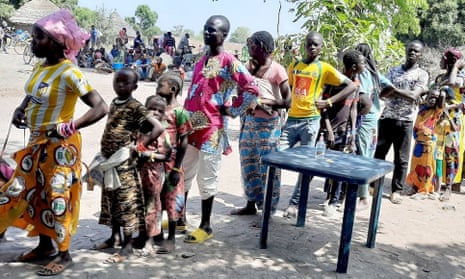The number of people having to leave their homes in the Lake Chad region of central Africa has more than doubled over the past year with agencies warning they are struggling to feed people.
The fighting, which last month claimed the life of the president of Chad, Idriss Déby, has displaced more than 400,000 Chadians, according to the International Organization for Migration, a rise from 169,000 at the start of 2020. More than 65,000 people were displaced in the first quarter of this year.
The World Food Programme (WFP) said it had been struggling to feed those in need. The agency expected a further 100,000 people living in the Kanem region, east of Lake Chad, to need food in the coming months, as the conflict between Chad’s army and the rebel forces, the Front for Change and Concord, showed no signs of easing.
“With current resources, WFP is able to provide emergency food assistance to some 223,000 out of the 401,000 internally displaced people in Lake Chad,” said Claude Jibidar, local WFP representative.
“We still need $67m [£48m] to support all internally displaced people until the end of the year, but funding is not forthcoming and many do not know where their next meal will come from.
“The humanitarian community is working to keep up with the pace of displacement but is still unable to provide an adequate and timely response.”
Bokoey Libyana left his village after it was attacked by Boko Haram last October. “They kidnapped our brothers … they also took about 10,000 of our cattle,” said the 52-year-old, whose five children are now out of school. “I need them to work. They spend most of their time collecting wood, so they can sell it in the market to buy food.”
Libyana shares his monthly aid rations with other families. “When we get our share of food from the WFP, we need to send some of that to the orphans of our brothers who were killed by Boko Haram.”
The family now live in Fourkhouloum, home to about 70,000 displaced people. The nearest healthcare facility is 19km (12 miles) away.
Bokoey Maidray, 47, has been in Fourkhouloum for nearly a year and is struggling to feed four wives and 15 children. “When days are like honey we can eat, have more than a meal. But when they are bad, we don’t eat,” said Maidray, who had hoped to return home last month, but was prevented by another attack on his village. “Boko Haram came back again to burn my house on 11 April, the same day of re-electing the president, they burned down all the houses there.”
According to WFP, 66% of Chadians live in severe poverty. The oil-rich country ranked 187 out of 189 nations in the human development index in 2020.
